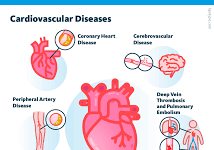COVID-19, the respiratory illness caused by the SARS-CoV-2 virus, has brought the world to a standstill since its emergence in late 2019. The virus spreads primarily through respiratory droplets produced when an infected person talks, coughs, or sneezes. In this essay, we will discuss the causes, symptoms, diagnosis, and treatment of COVID-19.
Causes of COVID-19:
The SARS-CoV-2 virus belongs to a family of viruses known as coronaviruses. The virus spreads mainly through respiratory droplets when an infected person talks, coughs, or sneezes. The virus can also spread by touching a surface contaminated with the virus and then touching one’s face. Close contact with an infected person can also lead to transmission.
Symptoms of COVID-19:
Symptoms of COVID-19 can range from mild to severe and can appear 2-14 days after exposure to the virus. The most common symptoms of COVID-19 include fever or chills, cough, shortness of breath or difficulty breathing, fatigue, muscle or body aches, headache, new loss of taste or smell, sore throat, congestion or runny nose, nausea or vomiting, and diarrhea. Some people infected with COVID-19 may be asymptomatic and not show any symptoms at all. However, they can still spread the virus to others.
Diagnosis of COVID-19:
Diagnosis of COVID-19 is typically done through a laboratory test called a PCR test. The test uses a swab to collect a sample from the nose or throat, which is then sent to a lab for analysis. Rapid antigen tests are also available, but they may have a higher chance of false-negative results compared to PCR tests. It is important to get tested as soon as possible if you experience any symptoms or have been in close contact with an infected person.
Treatment of COVID-19:
There is no specific treatment for COVID-19, but supportive care can be provided to alleviate symptoms and improve outcomes. Treatment may include rest and hydration, over-the-counter pain relievers, such as acetaminophen or ibuprofen, to reduce fever and relieve pain, oxygen therapy or mechanical ventilation for severe cases, antiviral medications, such as remdesivir, for hospitalized patients, and monoclonal antibody treatments, such as Regeneron or Eli Lilly, for high-risk patients.
Prevention measures for COVID-19:
Prevention measures for COVID-19 include getting vaccinated, wearing a mask, practicing physical distancing, avoiding large gatherings, washing hands frequently, and staying home when feeling sick. Vaccines have been shown to be highly effective in preventing severe illness and hospitalization from COVID-19. Masks are also effective in reducing the spread of the virus by preventing respiratory droplets from being released into the air.
In conclusion, COVID-19 is a highly contagious respiratory illness caused by the SARS-CoV-2 virus. It is important to be aware of the symptoms, get tested if necessary, and take necessary measures to prevent the spread of the virus. Vaccination, mask-wearing, physical distancing, and hand hygiene are essential in preventing the spread of the virus. If you experience symptoms of COVID-19, seek medical attention immediately.
































